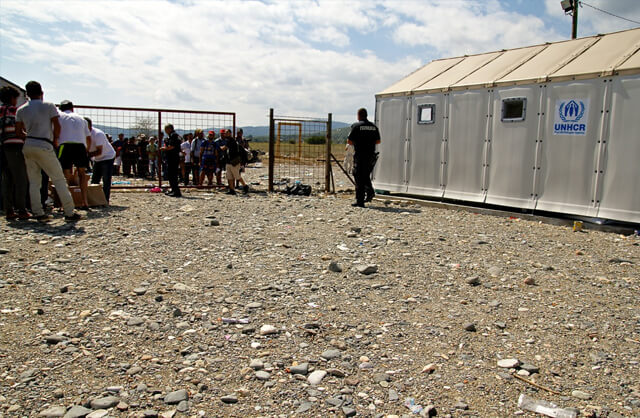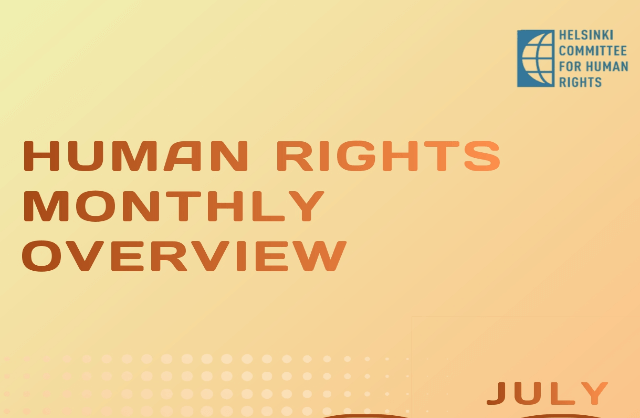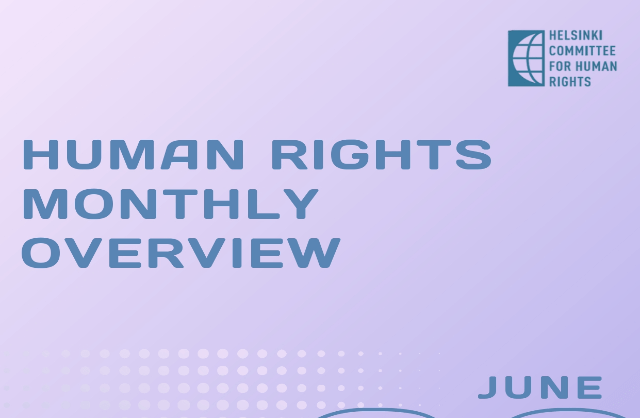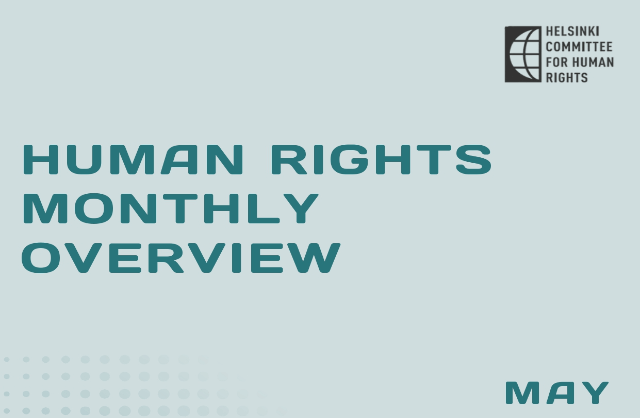The situation at the border crossings Gevgelija and Kumanovo for the period of July, 2017
August 14, 2017

Monthly report for July, 2017 on the situation at the border crossings Gevgelija and Kumanovo includes the following topics: Available facilities and conditions at the camp and Institutional treatment.
The situation with the refugee crisis in the Republic of Macedonia is relatively peaceful and has not undergone major changes, save for a few isolated cases. The number of refugees accommodated in the Reception Centers on the two borderlines remains low, with sporadic increases in the frequency of movement of the refugees. Apart from the regular maintenance of the camps, no major infrastructural changes have been observed. The refugees were facing extremely high temperatures, which was why they went out of their cabins only in the late hours of the afternoon. The stirring in the camp in Vinojug, Gevgelija has decreased, both on the part of the refugees and on the part on organizations present on field. Unlike there, the frequency of movement of the refugees in the Reception Center Tabanovce, Kumanovo has increased over the course of the month, although not all of them are regularly registered. Apart from the relatively peaceful situation, this month in the Camp in Tabanovce was marked by a police raid which resulted in the detention of about 10 refugees.
Gevgelija
Available facilities and conditions
The number of refugees in the camp remains between 10 and 16. At the start of the month, 13 refugees were accommodated in the camp, but this number went up to 16 by the end of the month, after a 4-member family originating from Syria arrived in the camp. A few of the families and refugees accommodated in the camp are already completing their procedures for family reunification and are soon expected to leave the camp.
The hygiene in the camp is at a satisfactory level.
The refugees have access to food and water, but a lack of summer clothes has been observed.
The refugees are provided with regular healthcare, as well as visits to the dentists when necessary.
Due to the high temperatures, and the decreased presence of organizations in the camp, the activities for the refugees are only organized on workdays, and not over the weekends.
Over the course of the month, representatives of several state institutions and international delegations paid visits to the camp. At the start of the month, a delegation of the Ministry of Interior paid a visit to the camp. Immediately ager, groups of French, Greek and Serbian representatives also visited the camp and got acquainted with the procedures for treatment of unaccompanied juveniles. On 17.07, the Head of the Crisis Management Center, Mr. Agron Buxhaku, visited the camp, while towards the end of the month UNHCR representatives paid a visit to the camp.
Institutional treatment
A juvenile person originating from Libya, who was brought to the camp over the course of the past month, was transferred to the Reception Center for Asylum Seekers, Vizbegovo, Skopje after first being assigned a custodian.
Over the month, a total of 23 refugees arrived in the camp, most of whom, with the exception of one person originating from Pakistan who was held in the camp 11 days, and one four-member family from Syria who was allowed to stay in the camp, i.e. the remaining 18 were transported back to Greece. The people who arrived have origin from various countries, such as: Pakistan (10), Afghanistan (2), Iraq (1), Algeria (3) and Syria (4). In most of the cases, their journey began from Greece or Turkey i.e. after staying there for a certain period of time, they decide to embark on the “Balkan Route”. Nearly all of them pay a certain amount of money to smuggling groups, in order to reach Serbia. After they are discovered by the Serbian police, they end up being taken back to Macedonian territory, whereby they themselves look for a way to go back to Greece.
The case with a refugee originating from Pakistan, who was brought to the camp by the police on 10.07.2017 was quite peculiar. The circumstances around this person’s accommodation in the camp were unclear, but what was worrying was that the person was held in a separate container for a few days, isolated from the rest of the refugees, and without the right to move through the camp unaccompanied. According to various rumours, it remained unclear whether the person was held due to suspicions that he was sick with Hepatitis C, or for security reasons. The Helsinki Committee addressed the Ministry of Interior with regards to this case.
The Helsinki Committee warns that keeping a refugee in a closed container in the Reception-Transit Camp is illegal and unjustified. Under no circumstances can a person staying in the camp be deprived of liberty or have her/his freedom of movement restricted. In case there are suspicions that the person has committed a crime, he/she should be adequately transported to a police station and informed in a language that he/she understands about the reasons for her/his detention, as well as be able to exercise all of his/her rights guaranteed in accordance with the national and international standards. On the other hand, in case the reason for detention were the suspicions that he had Hepatitis C, the Helsinki Committee urges the institutions to consult medical professionals with regards to disease transmission, in order to avoid panic among the refugees and the employees in the camp, as well as prevent unlawful restriction of liberty.
On 21.07.2017, this person was transported to Greece, at his own request. This person’s entire stay in the camp, as well as the fact that his freedom of movement was limited, has in no way whatsoever been registered or recorded by the competent institutions.
A refugee originating from Syria who had been staying in the camp for about 17 months, after a longer procedure for family reunification, was finally allowed to unite with his family in Germany. With the mediation of the Red Cross, the man got organized transported to the airport, wherefrom he will embark on his flight to Germany.
Kumanovo
Available facilities and conditions
The number of refugees gradually, yet significantly increased over the course of the month. At the start of the month there were 21 refugees in the camp, while by the end of the month this number reached up to around 60 people. The number of refugees constantly varies, and there are some among them who are registered, along with a large number of refugees who are not registered. The criteria according to which it is decided whether a refugee will be registered or not once he/she reaches the camp are not clear, but most often they depend on how long he/she will stay in the camp.
No infrastructural changes in the camp have been observed.
The majority of refugees are provided with food, even those who sporadically come from the vicinity of the camp. A problem occurs with the refugees who are not granted access, because the police bans the NGO representatives from giving them food over the camp fence. In certain cases, the mobile teams of the Red Cross provide food to the refugees staying in the vicinity of the camp.
Institutional treatment
The filtering of refugees in the camp still takes place selectively, without clear criteria on which refugees are to be admitted and which not. Thus, some of the refugees are allowed to enter only for a short period of time, i.e. only to get food and water, medical aid or stay the night in the camp. Some people are still not allowed to enter (for example, a group of 3 refugees originating from Libya)
At the very start of the month, on 01.07.2017, 18 refugees, 9 of whom registered, and 9 unregistered, were taken to Greece from the camp at their own request, by means or organized transport. After their departure, the number of refugees in the camp was 21. On the next day, 6 more juvenile persons from Afghanistan arrived in the camp and were immediately allowed in the camp and registered. By mid-month, the number of refugees increased at a low rate and reached 35, 24 of whom were registered refugees and 11 unregistered.
On 16.07.2017, in the early morning hours (around 5 am), a police action was conducted in the camp during which police officers, using physical force and means of coercion, detained about 10 refugees who were accommodated in the camp. Only a few of them managed to flee the police, while the rest of them were arrested while they were in their containers, handcuffed and taken to the vehicles of the police. There is no information about where they have been taken, nor what the goal of the action was and whether there was any justification for the use of physical force or means of coercion by the police officers. The Helsinki Committee sent a written request to the Ministry of Internal Affairs in order to obtain full clarification for the events and determine whether there was abuse of police powers.
The Helsinki Committee recommends conducting a full and adequate investigation into the police action that had been conducted, i.e. examination of the legal action of the police officers and the use of physical force and means of coercion on their part.
In the following days, the number of refugees continued increasing, whereby on 25.07.2017, the number of refugees reached 68, while by the end of the month it went up to 90.
One family from Iran orally expressed intent to seek asylum, whereby they were registered by the institutions and started the asylum seeking procedure. Several days later, a representative from the Ministry of Internal Affairs from Kumanovo arrived to the camp in order to have a talk with the family.
The Helsinki Committee urges the authorities to urgently and without any delay transport the people who have submitted an asylum request to the Reception Center for Asylum-seekers – Vizbegovo and provide respect for all the rights they are entitled to as asylum-seekers in accordance with the Law on Asylum and Temporary Protection.
One family originating from Afghanistan, at their own request, with the help of the Red Cross, were taken back to Greece. On 29.07.2017, on the other hand, two women were brought to the camp, along with 4 children who were caught by the police in the vicinity of the Sopot police station. According to them, they had returned on Macedonian territory from Serbia, and had expressed wish to go back to Greece.
Situation at the Reception Centers in the Republic of Macedonia
The number of people accommodated in the Reception Centers is not available.
Irregular Migration
In the course of July, the Ministry of Internal Affairs registered two events related to refugees.
The first case revolves around a person originating from Pakistan, who was brought to the Sopot police station on 22.07.2017 by the Red Cross. According to the person’s statement, he arrived in the village of Vaksince together with several more people from Pakistan. There, they were intercepted by three people, also from Pakistan, who were part of the smuggling groups operating in this region, in charge of intercepting the refugees upon arrival and seeing them off. On 21.07.2017, they met again and the smugglers asked them for 2,000 EUR per person in order to transport them to Serbia. After the person told them he had no money, they physically attacked him and took the money he had on him – 150 EUR. The person was taken to the RC Tabanovce, in order to give his statement on the incident. This is just another example of a hate crime committed against the refugees in the Republic of Macedonia.
In the second case, MoI informs that on 29.07.2017, also in the vicinity of the Sopot police station, a group of 6 refugees originating from Afghanistan (two women and 4 children) were spotted who had paid 1300 EUR per person in order to be transported by vehicle and were left in an unknown place. They were also taken to RC Tabanovce to await further procedure.


